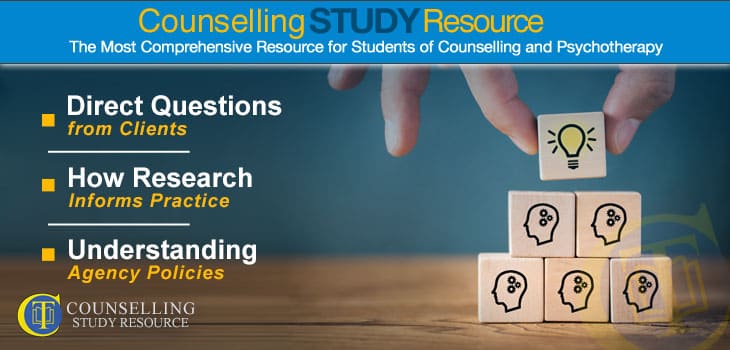089 – Direct Questions from Clients – How Research Informs Practice – Understanding Agency Policies
In episode 89 of the Counselling Tutor Podcast, Ken Kelly and Rory Lees-Oakes talk about how to respond when a client asks you a direct question. In ‘Practice Matters’, Rory describes the importance of research for counselling. Finally, the presenters discuss the importance of understanding agency policies and procedures.
Direct Questions from Clients (starts at 2.30 mins)
It is part of human nature to be curious about others and so to ask them questions about themselves – but in counselling training, we may be taught not to self-disclose. So how do we respond when asked direct questions by clients?
Some therapists might say that you shouldn’t answer the question but should instead direct it to back to the client. For example, if a client asked where you were going on holiday, you might then respond: ‘I’m wondering why it’s important to you to know that.’ Rory’s view is that this may not enhance the therapeutic relationship; he would usually choose to give a straight factual answer to this question himself. This can be useful in showing yourself to be human and so helping to build psychological contact.
Ken explains the dangers of ‘tag questions’ (where a statement is followed by a ‘hidden’ question, e.g. ‘isn’t it?’, ‘don’t they?’ or ‘shouldn’t he?’). These are often used by the speaker to gain agreement from the listener, and in social settings, it may be polite simply to let this pass. However, in the therapy room, tag questions can trap the novice counsellor into colluding with the client by agreeing with, for example, a prejudice (e.g. ‘That’s typical of men, isn’t it?’). In this situation, it is fine to challenge the client, but do avoid getting into a debate with them: instead, simply say that you disagree and explore the reasons for their belief.
There are two main ‘camps’ in counselling on self-disclosure. One would advocate disclosing nothing, while the other would suggest selective transparency, particularly when the self-disclosure could be argued to be in the client’s interests. There is no definitive right way: you need to decide yourself what approach feels appropriate to you and your practice.
What are your views on self-disclosure? Do/would you ever self-disclose – and if so, in what circumstances? Do let us know via the Counselling Tutor Facebook group. We also have a business page on Facebook, where you can leave us a review if you’ve found our podcast and other materials useful in your studies.
How Research Informs Practice (starts at 15.17 mins)
Rory describes the history and importance of research in the world of counselling and psychotherapy. Much research in more recent times has been in the field of neuroscience.
Evidence-based healthcare is seen as vital by the National Health Service in the UK, as supported and encouraged through the work of the National Institute for Health and Care Excellence (NICE). The British Association of Counselling and Psychotherapy (BACP) does much to support evidence-based practice in therapy in the UK.
Research evidence is important to help ensure that clients receive the best possible therapy – and to support counselling agencies in attracting funding (through being able to convince commissioners that their services are effective and therefore worth funding). Outcome measures such as GAD-7 and PHQ-9 are often used to collect quantitative evidence, while tools such as client feedback questionnaires can provide more qualitative information on service effectiveness.
Rory includes a number of important links in his handout, which can be downloaded here, and is also available in the Handouts Vault and Counselling Study Resource (CSR).
Understanding Agency Policies (starts at 20.07 mins)
It’s really important to ensure that you understand your agency’s policies – and of course the accompanying procedures. Ken suggests getting hold of hard copies of these if you can, as a resource to familiarise yourself with and to refer to when need be.
Perhaps one of the most important policies all as a student counsellor beginning your placement is that on limits to confidentiality – in particular the definition of ‘harm to self or others’, which varies in detail between agencies. In the event that a client discloses something that fits your agency’s definition of this, you need to know:
- who to speak to in the agency
- what will happen after that
- what support will be offered to the client.
When you read your agency’s policies, don’t be afraid to question them if you feel there are inconsistencies or areas for improvement. Rory and Ken report that they have known students who have done this, with the result that the policies have been changed.
Free Handout Download
The Importance of Research in Counselling
